Readings Newsletter
Become a Readings Member to make your shopping experience even easier.
Sign in or sign up for free!
You’re not far away from qualifying for FREE standard shipping within Australia
You’ve qualified for FREE standard shipping within Australia
The cart is loading…






Can traditional approaches to territorial jurisdiction adapt to the new global reality? Leading experts in criminal law and internet law unite to address this fundamental question. They consider whether this can be done through the development of parallel concepts such as extraterritorial or universal jurisdiction, or whether the situation requires completely new kinds of approaches to criminal jurisdiction and transnational crime.
The book illuminates the way in which questions of jurisdiction are becoming increasingly important to the investigation, prosecution, and punishment of crime, as with the growth of technology and the internet many crimes no longer take place within neat national boundaries. Increasingly, criminal lawyers grapple with complex answers to seemingly simple questions: - Where was the crime actually committed? - Which body has authority to investigate? - Which court has jurisdiction to hear the case and impose a sentence?
Part 1 looks at theoretical perspectives on criminal jurisdiction and how traditional jurisdictional concepts and understandings are being challenged, transformed, and reimagined in the era of the internet, cloud computing and social media. Part 2 homes in on the investigative powers of the state, to explore how these practical issues can inform the continuing transformation of current challenges.
$9.00 standard shipping within Australia
FREE standard shipping within Australia for orders over $100.00
Express & International shipping calculated at checkout
Can traditional approaches to territorial jurisdiction adapt to the new global reality? Leading experts in criminal law and internet law unite to address this fundamental question. They consider whether this can be done through the development of parallel concepts such as extraterritorial or universal jurisdiction, or whether the situation requires completely new kinds of approaches to criminal jurisdiction and transnational crime.
The book illuminates the way in which questions of jurisdiction are becoming increasingly important to the investigation, prosecution, and punishment of crime, as with the growth of technology and the internet many crimes no longer take place within neat national boundaries. Increasingly, criminal lawyers grapple with complex answers to seemingly simple questions: - Where was the crime actually committed? - Which body has authority to investigate? - Which court has jurisdiction to hear the case and impose a sentence?
Part 1 looks at theoretical perspectives on criminal jurisdiction and how traditional jurisdictional concepts and understandings are being challenged, transformed, and reimagined in the era of the internet, cloud computing and social media. Part 2 homes in on the investigative powers of the state, to explore how these practical issues can inform the continuing transformation of current challenges.